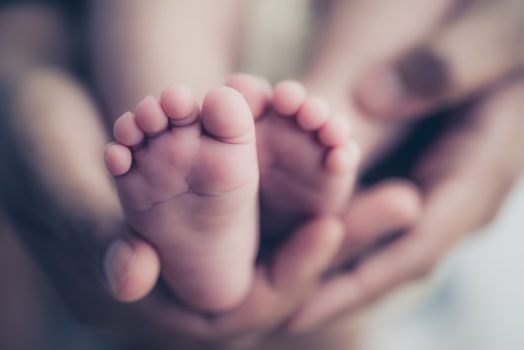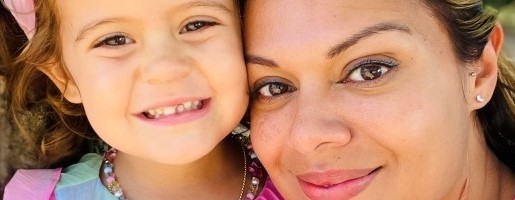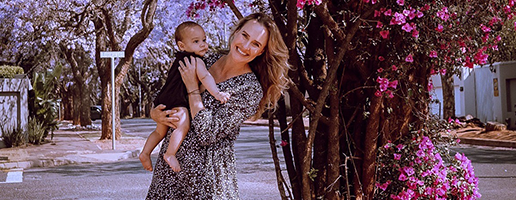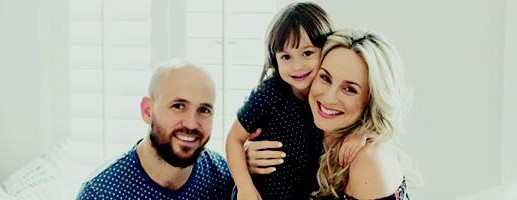"Banking my children's stem cells could prevent or heal something major": Attiya Ebrahim

"I see stem cell banking as a big back up plan," says Attiya Ebrahim. "As a pedantic mom who wants to plan ahead, it makes me feel reassured about my children's future health. Attiya banked stem cells when three of her four daughters were born.
Attiya heard about stem cell banking when she was pregnant for the first time and her obstetrician mentioned it to her. "It was a foreign concept to me. I wasn't sure how they do the collecting, how they would get the stem cells from where we lived in Zimbabwe to Johannesburg to be stored, and whether the procedure was Islamic. That's why we didn't do stem cell banking for our first child," she says.
However, Attiya and her husband decided to bank stem cells when their second daughter was born.
"We lived in Johannesburg by then, which made things easier. I also realised that, as a Muslim, we'd still be abiding by our religion if we banked stem cells because the placenta is discarded once the tissues have been collected, as required. And for me, it's about what feels right. If I'm trying to secure my children's future health through something that is derived from the child, I don't see that as a problem."
Attiya stored her babies' stem cells through Netcells, Next Biosciences' stem cell banking service. Through Netcells, expectant parents have the opportunity to collect both their new born baby's umbilical cord blood and tissue stem cells at birth, and bank them for potential future medical use.
What are stem cells?
Stem cells are the original building blocks of life - they are the first cells that form. While stem cells are found in the adult body - and continually maintain and repair tissue - collecting them is difficult and they are largely restricted to forming the tissue they are originally found in.
One of the easiest ways to retrieve stem cells is through the umbilical cord tissue and the cord blood. These contain large numbers of new stem cells that can potentially differentiate into any of the 200-odd types of cells that make up the human body.
Stem cells can be used to help in the treatment of several blood or immune disorders and to regenerate bone marrow. They are routinely used to treat diseases such as Fanconi's anaemia, leukaemia, lymphoma, thalassemia, and sickle cell anaemia. New therapies using stem cells are currently in research and clinical trials.
Stem cells represent a perfect donor match for the baby they've been collected from and pose no risk of rejection when transplanted. There is also a 25% possibility that the stem cells will be a suitable match for a sibling.
Given our family's medical history we didn't want to take any chances
Soon after she was born, Attiya's second child was diagnosed with hydronephrosis, a severe kidney condition. She has undergone several major surgeries in the past four years.
Attiya is comforted by the thought that her daughter's stem cells could perhaps help her kidney condition one day. "Her kidney is strained because there's thinning of the kidney wall. I'm hopeful that the stem cells could help if we ever need to grow a new kidney for her."
"When we continued having children, we decided that we definitely wanted to do stem cell banking for all of them. We were motivated to do this because of our second child's kidney problem, but also due to my medical history."
Attiya has polycystic ovary syndrome, hearing loss, tinnitus, Hashimoto's disease and fibromyalgia. "There are other health issues in our family like cholesterol and high blood pressure. And my father died from kidney disease after having diabetes for 40 years. You can't be sure how these conditions could manifest in our children."
"We never know how science will advance as more research is done. It makes me feel better to know that if something comes up, especially because my health record is not squeaky clean, that we could fall back onto the banked stem cells as a solution to prevent or heal something major in our children. And we know that the banked stem cells are an exact match for each child."
The potential of stem cells to help Attiya
While Attiya and her husband banked the stem cells to help their children one day, if necessary, she said she would also use them if they could help to treat one of her health conditions.
"My doctor has suggested surgery and cochlear implants to treat my tinnitus and hearing loss. It has crossed my mind that I could turn to one of my children's stem cells if there's the future possibility of an easier, less invasive, or even longer lasting treatment."
Registering and collecting was effortless
"The process of registering online and the delivery of the kit was simple. I have no complaints," says Attiya. After registering, a Netcells collecting kit was delivered to Attiya's home for her to take with to the delivery room.
"The collecting of the stem cells was effortless. It worked like clockwork. My midwife knew exactly what needed to be done."
"Netcells is very organised and they test the tissue to determine whether it is viable. If for some reason they are not viable, you receive a full refund, excluding the administration fee. Their testing gave me peace of mind, because no matter how many babies you have, each one is different."
The discounts made a huge difference
"The discounts we received were a big deal for us. We got discounts for being Discovery Health Medical Scheme members, for making a once-off payment in advance, and we also got sibling discounts for the second and third times we banked stem cells. For each child we've paid for the stem cells to be stored until they turned 20. The discounts made a huge difference to us!"
Learn more about the exclusive Discovery Health stem cell banking offer here
Related articles

Dr Farzana Araie banked stem cells as an 'insurance policy' for her children's future health
Dr Farzana Araie's daughter was born in 2019 and her son in 2022. Farzana decided to bank stem cells at the birth of both her babies as an 'insurance policy' into their future health. She explains this decision and how the process worked.

Stem cell banking - the natural choice for Misha
New mom Misha Levin has taken the ultimate step in securing her children's future health by collecting and banking their stem cells at birth through Netcells. She explains what stem cell banking is, why she decided to do it and how the process works.

To bank or not to bank: the stem cell question
NetCells, Next Biosciences' umbilical cord stem cell banking service, gives expectant parents the opportunity to collect their new born baby's umbilical cord blood and tissue stem cells and cryogenically store them for potential future medical use.